短文改错专题复习研究课教案
短文改错教学设计(优秀范文五篇)
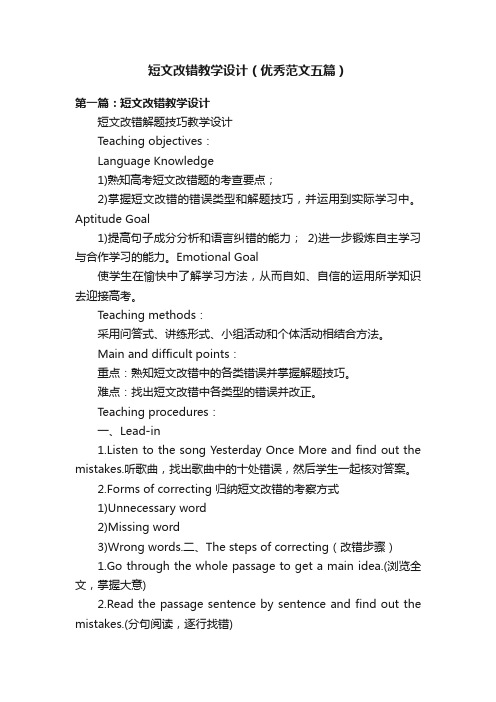
短文改错教学设计(优秀范文五篇)第一篇:短文改错教学设计短文改错解题技巧教学设计Teaching objectives:Language Knowledge1)熟知高考短文改错题的考查要点;2)掌握短文改错的错误类型和解题技巧,并运用到实际学习中。
Aptitude Goal1)提高句子成分分析和语言纠错的能力;2)进一步锻炼自主学习与合作学习的能力。
Emotional Goal使学生在愉快中了解学习方法,从而自如、自信的运用所学知识去迎接高考。
Teaching methods:采用问答式、讲练形式、小组活动和个体活动相结合方法。
Main and difficult points:重点:熟知短文改错中的各类错误并掌握解题技巧。
难点:找出短文改错中各类型的错误并改正。
Teaching procedures:一、Lead-in1.Listen to the song Yesterday Once More and find out the mistakes.听歌曲,找出歌曲中的十处错误,然后学生一起核对答案。
2.Forms of correcting 归纳短文改错的考察方式1)Unnecessary word2)Missing word3)Wrong words.二、The steps of correcting(改错步骤)1.Go through the whole passage to get a main idea.(浏览全文,掌握大意)2.Read the passage sentence by sentence and find out the mistakes.(分句阅读,逐行找错)3.Read the passage for the third time, and check the answers.(再次阅读,检查核对)三、The types of mistakes(短文改错错误类型的训练和归纳)通过学生合作练习,归纳总结,熟练掌握口诀:动词形,名词数,特别留意形和副;并从连词常常考,冠词介词常光顾;代词注意性数格,词组句式需关注。
高考英语一轮复习《短文改错》教案.doc
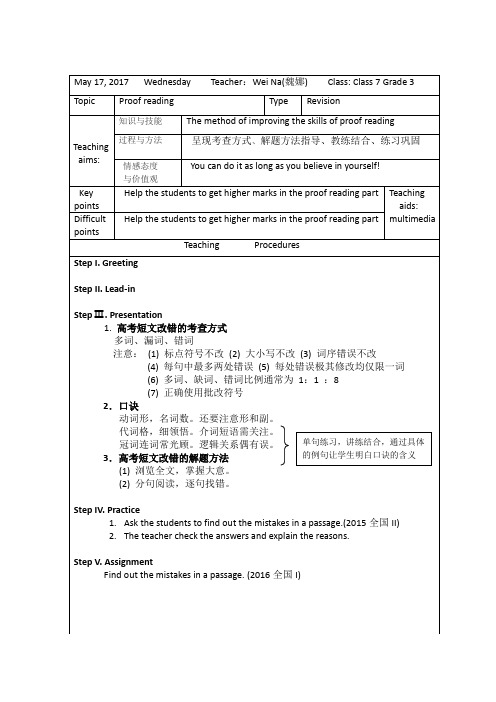
精美句子1、善思则能“从无字句处读书”。
读沙漠,读出了它坦荡豪放的胸怀;读太阳,读出了它普照万物的无私;读春雨,读出了它润物无声的柔情。
读大海,读出了它气势磅礴的豪情。
读石灰,读出了它粉身碎骨不变色的清白。
2、幸福幸福是“临行密密缝,意恐迟迟归”的牵挂;幸福是“春种一粒粟,秋收千颗子”的收获. 幸福是“采菊东篱下,悠然见南山”的闲适;幸福是“奇闻共欣赏,疑义相与析”的愉悦。
幸福是“随风潜入夜,润物细无声”的奉献;幸福是“夜来风雨声,花落知多少”的恬淡。
幸福是“零落成泥碾作尘,只有香如故”的圣洁。
幸福是“壮志饥餐胡虏肉,笑谈渴饮匈奴血”的豪壮。
幸福是“先天下之忧而忧,后天下之乐而乐”的胸怀。
幸福是“人生自古谁无死,留取丹心照汗青”的气节。
3、大自然的语言丰富多彩:从秋叶的飘零中,我们读出了季节的变换;从归雁的行列中,我读出了集体的力量;从冰雪的消融中,我们读出了春天的脚步;从穿石的滴水中,我们读出了坚持的可贵;从蜂蜜的浓香中,我们读出了勤劳的甜美。
4、成功与失败种子,如果害怕埋没,那它永远不能发芽。
鲜花,如果害怕凋谢,那它永远不能开放。
矿石,如果害怕焚烧(熔炉),那它永远不能成钢(炼成金子)。
蜡烛,如果害怕熄灭(燃烧),那它永远不能发光。
航船,如果害怕风浪,那它永远不能到达彼岸。
5、墙角的花,当你孤芳自赏时,天地便小了。
井底的蛙,当你自我欢唱时,视野便窄了。
笼中的鸟,当你安于供养时,自由便没了。
山中的石!当你背靠群峰时,意志就坚了。
水中的萍!当你随波逐流后,根基就没了。
空中的鸟!当你展翅蓝天中,宇宙就大了。
空中的雁!当你离开队伍时,危险就大了。
地下的煤!你燃烧自己后,贡献就大了6、朋友是什么?朋友是快乐日子里的一把吉它,尽情地为你弹奏生活的愉悦;朋友是忧伤日子里的一股春风,轻轻地为你拂去心中的愁云。
朋友是成功道路上的一位良师,热情的将你引向阳光的地带;朋友是失败苦闷中的一盏明灯,默默地为你驱赶心灵的阴霾。
短文改错专题教案

短文改错专题教案短文改错专题一、短文改错的文章特点体裁以记叙文为主,句子结构以简单句为主,至少有一个从句,一个并列句,句子总数十句左右。
二、短文改错的错误类型1、缺(多)词丢介词、丢(多)to 、丢 be2、错词词性用错名词、形容词、副词词形用错形容词:原级比较级最高级副词:原级比较级最高级动词:时态错误主谓不一致非谓语动词拼写相似词用错:如beside bedides具体词用错(主要是用同类词替换)连词用错代词用错介词用错冠词用错三、短文改错涉及的知识点1、动词,①主谓一致②时态:并列句中,连词(and/but/or)前后动词时态一致!简单句中,动词时态和前后两句话动词时态一致。
③语态:物做主语时,注意是否需要改为被动④非谓语动词2、名词,①单复数②名词变词性,变为形容词或副词(直接变副词很少见)③名词变所有格,单数加’s,复数加’3、代词,①人称代词主宾格、单复数、逻辑对象②不定代词肯否定③反身代词单复数、逻辑对象④物主代词形容词性物主代词还是名词性物主代词、逻辑对象注:逻辑对象是指按照行文逻辑能够明确的对象。
比如说通过上下文可以知道是“和他说话”,但短文中却说talk with me,就是明显的逻辑对象错误。
改错中常出现混淆逻辑对象的情况。
4、形容词,①名词与形容词、形容词与副词词性互变②形容词使用原级、比较级、最高级5、副词,①副词与形容词词性互变②副词原形、比较级、最高级6、冠词,①使用冠词、不使用冠词②使用定冠词、使用不定冠词③使用a、使用an7、连词,①语法错用,that和what的用法②逻辑关系错用,and、but、or③意思错用,如状语从句中明明是时间却用where等。
8、介词,①固定搭配错误②意思错误,语法上可搭配,语意不通。
③介词缺失④介词多余,及物动词后不加介词四、短文改错的做题方法1、步骤:1快速通读全文,切忌拿来就改。
三看:看人(人称)、看事(短文意思)、看时间(行文时态)2分句阅读,逐行找错。
短文改错专项复习教案
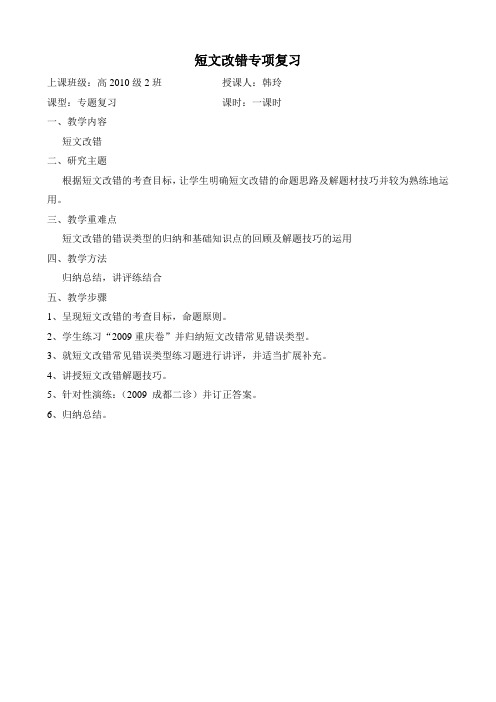
短文改错专项复习
上课班级:高2010级2班授课人:韩玲
课型:专题复习课时:一课时
一、教学内容
短文改错
二、研究主题
根据短文改错的考查目标,让学生明确短文改错的命题思路及解题材技巧并较为熟练地运用。
三、教学重难点
短文改错的错误类型的归纳和基础知识点的回顾及解题技巧的运用
四、教学方法
归纳总结,讲评练结合
五、教学步骤
1、呈现短文改错的考查目标,命题原则。
2、学生练习“2009重庆卷”并归纳短文改错常见错误类型。
3、就短文改错常见错误类型练习题进行讲评,并适当扩展补充。
4、讲授短文改错解题技巧。
5、针对性演练:(2009 成都二诊)并订正答案。
6、归纳总结。
高考语文二轮复习教案:短文改错专题

高考语文二轮复习教案:短文改错专题短文改错专题在高考语文考试中,短文改错是一个非常常见的题型,考察的是学生对语文知识积累、理解和运用的能力。
因此,在语文二轮复习中,短文改错是一个需要重点复习和训练的题型之一。
一、选材原则短文改错的选材应该具有代表性和典型性,能够涵盖高考考点的重点、难点和热点。
同时,要求短文语言简洁、意思清晰,句子结构复杂度适中,涵盖词汇、语法和修辞三方面的知识点,适合搭配练习策略进行训练。
二、练习策略1.筛选方法:可以由老师或同学筛选出一篇典型短文,然后让学生在规定时间内进行修改,发现、修改错误,同时要求学生对每一个错词、错句进行归纳和总结,做到及时反思和记录,以便后期查漏补缺。
2.梳理知识点:根据以往高考的出题情况和短文特点,将短文涉及的语法、词汇和修辞三方面的重点、难点和热点知识点进行梳理和总结,形成知识点表格或分类清单,以便学生进行查漏补缺和重点回顾。
3.模拟练习:模拟高考的试卷题目和时间,让学生进行模拟考试,并进行错题分析和总结,形成错题集,以便加强对知识点的掌握和理解,提高解题效率和准确度。
三、知识点总结1.词语拼写:包括单词、词组和固定搭配的拼写。
如形近词、易混词、多音字的辨析和运用等。
2.语法错误:包括时态、语态、主谓一致、名词性从句、定语从句、状语从句、倒装等语法知识点的掌握和运用。
3.句子结构错误:包括主谓宾、主语补足语、宾语补足语、同位语、并列句、复合句等句子结构的掌握和运用。
4.修辞错误:包括比喻、拟人、夸张、排比、设问等修辞手法的掌握和运用。
短文改错作为高考语文中的一道重要题型,既考察了学生的语文知识运用能力,又考察了其反思和总结能力。
因此,在语文二轮复习中,短文改错的训练与重点复习是必不可少的。
要通过筛选教材、梳理知识点、模拟练习等方法,让学生能够熟练掌握短文改错的技巧和方法,顺利通过高考语文考试。
高考英语短文改错专题教案[教学]
![高考英语短文改错专题教案[教学]](https://img.taocdn.com/s3/m/a9512a6b42323968011ca300a6c30c225801f053.png)
高考英语短文改错专题教案[教学]第一章:短文改错概述1.1 短文改错定义解释短文改错的概念和重要性强调高考英语短文改错的要求和评分标准1.2 短文改错类型介绍常见的短文改错类型,如拼写错误、语法错误、用词不当等举例说明每种类型的错误特点和修改方法1.3 短文改错技巧分享有效的短文改错技巧,如仔细阅读、对比分析、查找规律等第二章:词汇错误改错2.1 拼写错误分析常见的拼写错误原因,如音似形似词混淆、字母遗漏或多余等练习修改给出的句子中的拼写错误,并提供正确拼写选项2.2 词义辨析讲解易混淆的词义,如affect和effect、bored和boring等通过练习题让学生区分词义,并提供正确选项2.3 词语搭配介绍常见的词语搭配错误,如“make a progress”应为“make progress”练习修改句子中的搭配错误,并提供正确搭配选项第三章:语法错误改错3.1 句子结构错误讲解句子结构的基本原则,如主谓一致、主语缺失等练习修改句子结构错误,并提供正确句子结构选项3.2 时态和语态错误分析常见的时态和语态错误,如过去时与现在时的混淆等练习修改句子中的时态和语态错误,并提供正确选项3.3 情态动词和助动词错误讲解情态动词和助动词的正确使用,如can和may的区分等练习修改句子中的情态动词和助动词错误,并提供正确选项第四章:句子连接错误改错4.1 逻辑连接词错误讲解逻辑连接词的重要性,如however、in addition等练习修改句子中的逻辑连接词错误,并提供正确选项4.2 平行结构错误分析常见的平行结构错误,如“He likes to watch TV and listen music”应改为“He likes to watch TV and listen to music”练习修改句子中的平行结构错误,并提供正确选项4.3 指代错误讲解指代词的正确使用,如代词的一致性和指代明确等练习修改句子中的指代错误,并提供正确选项第五章:综合练习与拓展5.1 改错练习题引导学生独立完成练习题,并给予解答和反馈5.2 拓展阅读推荐一些适合高考学生的英语阅读材料,以提高阅读能力和语感指导学生如何从拓展阅读中学习和应用改错技巧5.3 总结与复习总结本专题的主要内容和改错技巧鼓励学生进行复习和自主练习,巩固所学知识第六章:高考真题解析6.1 近年高考短文改错真题回顾分析近几年的高考英语短文改错真题,总结出题规律和难度趋势强调真题的重要性,指导学生如何利用真题进行备考6.2 真题类型和解题策略详细解析不同类型的真题,如故事类、说明类、议论文类等分享解题策略,如先易后难、排查法、逻辑分析法等6.3 真题模拟练习提供一份高考真题模拟练习,让学生familiarize themselves with 高考短文改错的题型和难度引导学生独立完成练习,并给予解答和反馈第七章:学生作文常见错误分析7.1 学生作文常见错误分类分析学生作文中的常见错误,如词汇错误、语法错误、连接词错误等举例说明每种错误的特点和影响7.2 错误原因和修改策略探讨学生犯错的原因,如语言基础不扎实、粗心大意等提供相应的修改策略,如回头检查、请教老师同学等7.3 作文改错实战演练提供一份学生作文样本,标注出其中的错误引导学生进行作文改错练习,提高学生的作文质量和改错能力第八章:高考英语短文改错策略8.1 改错步骤和技巧介绍高考英语短文改错的步骤和技巧,如快速浏览、细节检查等强调每个步骤的重要性,指导学生如何有效地进行改错8.2 时间管理和心理调适分享如何在考试中合理分配时间进行短文改错,提高答题效率讨论考试中的心理压力和应对策略,帮助学生保持冷静和专注8.3 考前冲刺建议给出考前冲刺阶段的建议,如加强真题练习、总结错题等第九章:高考英语短文改错模拟试题9.1 模拟试题设计设计一份具有针对性的高考英语短文改错模拟试题确保试题质量,提高学生的应试能力9.2 模拟考试和答案解析安排一次模拟考试,让学生熟悉考试环境和时间压力提供详细的答案解析,帮助学生理解和巩固改错技巧第十章:总结与展望10.1 专题总结回顾整个高考英语短文改错专题,总结重点和难点强调学生通过本专题的学习,应掌握的改错技巧和策略10.2 展望未来鼓励学生继续努力学习和实践,不断提高自己的英语水平提醒学生高考英语短文改错并非一蹴而就,需要长期积累和训练10.3 鼓励和祝福对学生表达鼓励和祝福,希望他们在高考中取得优异的成绩重点解析本文档为高考英语短文改错专题教案,共十章。
短文改错专题复习研究课教案

短文改错专题复习研究课教案Teaching aims:How to do mistake correctingTeaching emphasis:The correct process of dealing with this exerciseTeaching process:Ⅰ. Lead-in1. Ask the students some questions about the mistakes in life.⑴ Have you ever made any mistakes in your everyday life?⑵ Do you think that there is someone that doesn’t make any mistakes in his life?⑶ What will you do if you make some mistakes in your life?⑷ Does it matter if y ou make a mistake in your everyday life?2. Let the students discuss these questions and according to their answers draw theconclusion: In our everyday lives, if we make some mistakes, we should correctthem, then we are still a good fellow. (Chairman Mao’s words)Ⅱ. Presentation1. The teacher’s brief introduction:We know in our everyday lives, when we make some mistakes we can correct themin time. And also when we are using languages, we may make some mistakes. Sotoday we are going to deal with this kind of exercise: Mistake Correcting (givingthis topic on the blackboard)2. Give the next six sentences on the slide:① What a nice weather it is!② The Smiths did his best to help me.③ “Stop talking,” he said his students.④ It’s very kind for you to d o so.⑤ Although he studied hard, but he failed.⑥ Please tell them come here at once.3. Discuss these six sentences and correct the mistakes in them with the rightsigns.4. Summarize the three kinds of mistakes appearing in these sentences:Unnecessary Word Missing Word Wrong WordⅢ. Practice1. Give the first passage on the slide and ask the students to discuss it.Passage 1Hello. I learn about you from my English teacher, 1. ________ Miss Fang. I’d like to your penfriend, and get to 2. ___know more about your country.First, let me tell you something more about myself. 3. ___My name is Li Hua. I live in Beijing, where is the 4. ___capital of China. I go to Hongqi School. We 5. ___study quite a few subject, such as maths, Chinese, 6. ___English and physics. I use to play ping-pong a lot 7. ___in my spare time, but now I am interesting in football. 8. ___ Do you play any ball games? What your favourite 9. ___sport? I look forward to hear from you soon 10. ___Yours,Li Hua2. Check the answers one by one and explain the mistakes init.3. Let the students pay special attention to the signs that should be made.Ⅳ. IntroductionIntroduce the methods and techniques of finishing the exercise of mistake correcting on the slide. Let the students read it and discuss it by themselves.短文改错的解题方法与技巧1.首先要细读全文,弄懂全篇的意思。
关于学习短文改错的教案
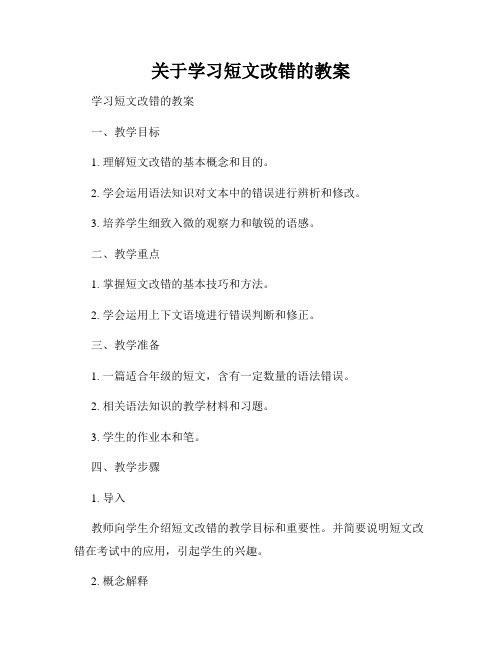
关于学习短文改错的教案学习短文改错的教案一、教学目标1. 理解短文改错的基本概念和目的。
2. 学会运用语法知识对文本中的错误进行辨析和修改。
3. 培养学生细致入微的观察力和敏锐的语感。
二、教学重点1. 掌握短文改错的基本技巧和方法。
2. 学会运用上下文语境进行错误判断和修正。
三、教学准备1. 一篇适合年级的短文,含有一定数量的语法错误。
2. 相关语法知识的教学材料和习题。
3. 学生的作业本和笔。
四、教学步骤1. 导入教师向学生介绍短文改错的教学目标和重要性。
并简要说明短文改错在考试中的应用,引起学生的兴趣。
2. 概念解释教师给学生讲解短文改错的基本概念,即在一篇短文中找出并改正错误的语法和拼写问题。
强调短文改错的目的是提高语言运用的准确性和流畅度。
3. 技巧指导教师给学生介绍一些常见的短文改错技巧和方法,例如注意主谓一致、时态的使用、单复数等。
同时,教师提醒学生在判断错误时要根据上下文语境进行分析,避免将正确的部分误判为错误。
4. 例题演练教师以一个例题为例,展示给学生短文改错的具体步骤和操作。
教师可以通过将短文投影到黑板上的方式,或者直接在教室内发放纸质的例题给学生,要求学生找出错误并进行修改。
同时,教师在黑板上进行实时批改,帮助学生纠正错误。
5. 合作讨论教师组织学生分组进行合作讨论,每个小组选出一名代表在黑板上进行短文改错,并向全班汇报错误和修改。
其他小组成员可以提出意见和建议。
6. 学生实践教师分发短文给学生,要求学生独立完成短文改错,并在规定时间内提交给教师。
教师可以采用集体批改或逐个批改的方式,根据学生的实际情况,给予具体的指导和建议。
7. 总结回顾教师带领学生回顾短文改错的基本概念和步骤,强调在实际运用中要注重细节的观察和分析。
并展示一些学生优秀作品,鼓励学生在以后的学习中持续努力。
五、课后作业教师布置课后作业,要求学生选择一篇短文进行改错,并在作业本上进行修改。
学生提交作业后,教师进行批改并给予反馈。
高考英语短文改错专题教案[教学]
![高考英语短文改错专题教案[教学]](https://img.taocdn.com/s3/m/070679939fc3d5bbfd0a79563c1ec5da50e2d608.png)
高考英语短文改错专题教案[教学]一、教学目标:1. 让学生掌握短文改错的基本技巧和方法。
2. 提高学生对英语语法的理解和运用能力。
3. 培养学生认真细致的阅读和审题习惯。
二、教学内容:1. 短文改错的概念和意义。
2. 常见的短文改错类型及实例分析。
3. 短文改错的解题策略和技巧。
4. 针对性练习和模拟试题。
三、教学过程:1. 引入:通过一个简单的改错练习,引发学生对短文改错的兴趣和思考。
2. 讲解:详细讲解短文改错的概念、类型和技巧。
3. 实例分析:分析一些典型的短文改错案例,让学生深刻理解改错的重要性。
4. 练习:设计一些针对性练习,让学生运用所学知识和技巧进行改错。
四、教学评价:1. 课堂参与度:观察学生在课堂上的积极参与程度和提问回答情况。
2. 练习完成情况:检查学生完成练习的情况,以及对错题的分析和理解程度。
3. 学生反馈:收集学生对教学内容和教学方法的反馈,以便进行教学调整和改进。
五、教学资源:1. 教学PPT:制作精美的教学PPT,展示短文改错的概念、类型和技巧。
2. 练习材料:准备一些有针对性的练习和模拟试题,供学生在课堂上进行练习和巩固。
3. 参考资料:提供一些参考资料,让学生课后进一步学习和拓展。
六、教学策略:1. 采用问题驱动的教学方法,引导学生主动发现和分析错误。
2. 通过小组合作和讨论,促进学生之间的交流和思维碰撞。
3. 利用多媒体教学资源,增加课堂的趣味性和互动性。
4. 注重个性化教学,针对不同学生的错误类型进行有针对性的指导。
七、教学实践:1. 设计多样化的练习题,涵盖不同类型的错误,提高学生的应试能力。
2. 引导学生关注语境和逻辑关系,培养学生的语境意识。
3. 教授学生使用排除法等解题技巧,提高解题效率。
4. 定期进行模拟测试,检验学生的学习效果。
八、作业与反馈:1. 布置相关的改错练习作业,要求学生在课后进行自主学习。
2. 鼓励学生互相批改作业,提高学生的改错能力。
高三英语短文改错专题复习教案
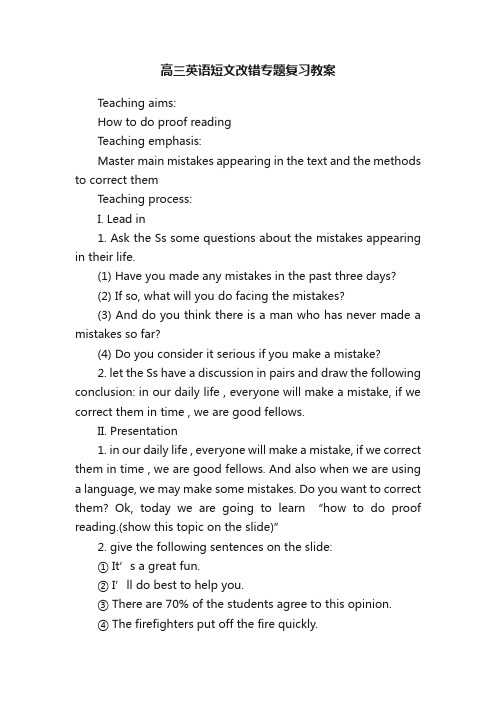
高三英语短文改错专题复习教案Teaching aims:How to do proof readingTeaching emphasis:Master main mistakes appearing in the text and the methods to correct themTeaching process:I. Lead in1. Ask the Ss some questions about the mistakes appearing in their life.(1) Have you made any mistakes in the past three days?(2) If so, what will you do facing the mistakes?(3) And do you think there is a man who has never made a mistakes so far?(4) Do you consider it serious if you make a mistake?2. let the Ss have a discussion in pairs and draw the following conclusion: in our daily life , everyone will make a mistake, if we correct them in time , we are good fellows.II. Presentation1. in our daily life , everyone will make a mistake, if we correct them in time , we are good fellows. And also when we are using a language, we may make some mistakes. Do you want to correct them? Ok, today we are going to learn “how to do proof reading.(show this topic on th e slide)”2. give the following sentences on the slide:① It’s a great fun.② I’ll do best to help you.③ There are 70% of the students agree to this opinion.④ The firefighters put off the fire quickly.3. analyse the kinds of mistakes appearing in these sentences.unnecessary word missing word wrong word4. show the table on the slide and let the Ss know about what kinds of mistakes often appear in proof reaing.年度试题冠词名词连词形容词/副词代词动词时态主谓一致动词本身介词文义2000 1 1 3 1 1 1 12001 1 2 1 1 1 2 1 12002 1 1 2 1 1 1 1 12003 1 1 3 1 1 1 12004 1 3 1 1 3III. Practice1. Give the passage on the slide and ask the students to discuss it.This is a story told by my father: “when I was boy, 1.___________The most exciting thing was when to celebrate the Spring 2. ___________Festival. My grandma was the best cooker in the world 3. ___________but could make the most delicious dishes. One time, I just 4. ___________couldn’t wait for the Spring Festival dinner. As I was 5. ___________about take a piece from a cooked duck.. I saw grandma in 6. ___________the kitchen looking at me.Shake her head, she said, “it 7. ___________isn’t a good time to do that ,dear.” At once , I apologize 8. ___________and controlled me at me best till the dinner started.You 9. ___________know, that was a dinner we had waited for several month. 10. ___________2. check the answers with the students and explain the mistakes in it.IV.show the following techniques of doing proof reading on the slide. And do some exercises.短文改错解题步骤与方法解题步骤1 通读全文,从语篇入手,理解文章大意2 在理解大意的基础上,审查句子结构3 从语法结构入手,进行语法改错4 通读全文解题方法:从以下方面入手1.冠词: 注意固定结构,特指泛指,Suddenly,I caught a sight of my English teacher. 2000My teacher advised me to keep my diary. 20032.名词:注意单复数,可数不可数,主谓一致On the way up I was busy taking picture. 2002Their word were a great encouragemet to me. 20033. 连词:注意句子逻辑关系,连词对称性It seems always difficult for me to do things well as my classmates. 2004I’m trying to improve the situationg since it doesn’t seem to work. 20044. 形容词/副词:注意形容词副词混用,比较级最高级用法,修饰比较级的副词I would describe myself as shy and quietly. 2004She called 119 immediate. 2004福建5.代词:注意前后一致,人称代词偷换错用,少代词I have a good friend who’s name is Liu Mei. 2004福建We have to do the washing, cleaning and shopping by us. 2004 天津6.动词:注意时态/语态,第三人称单数,非谓语动词,主从句时态一致I remembered her words and calm down. 2000Today it is much easier to be healthy than it is in the past. 93 Play football makes us grow up tall and strong. 2000They will do all they can make sure that I get a good education. 20017.介词:注意固定短语.介词后宾语形式I’ll spend the whole weekend reading and prepar for the exam. 01北京I’m looking forward to hear from you soon. 94V. Group work.1. Give a second passage on the slide. Divide the students into groups of four and have a competiton: which group can get the corrcet answers first? Pay attention to the above methods.Living is risky. Crossing the road, driving a car, flying,swallowing an aspirin tablet or eating a chicken sandwich-theycan all be fatal. Clearly some risks worth taking, especially 71._______when the rewards are high: a man surrounded by flames and smoke generally considers that jumping out of a second floorwindow is an acceptable risk to save its life. But in medicine a 72._______few procedures, drugs, operations or tests are really a matterof 73._______life and death. There may be sound medicine reasons for ac- 74. _______cepting electrical shock treatment, but such reasons are totallydependent in the balance of risks and benefits for the patients. 75. _______Surgery for cancer may cure or prolong a life, but the re-moval of tonsils(扁桃体)cannot save anything a sore throat.76. _______Blood pressure drugs definitely help some people live after aheart attack, but these same drugs may be both necessary and 77. _______harmful for those with only mild blood pressure problems.Deciding how much discomfort and risk we are preparing to 78._______put up with in the name of better health is a high personal mat- 79. _______ter, not a decision we should remain to doctors alone. 80. _______2.let the group that first finish it give their answers and check them with the whold class.VI. consolidationShow the following rules on the slide:短文改错注意问题1.词序不改,一词不改成两词。
短文改错专题复习研究课教案
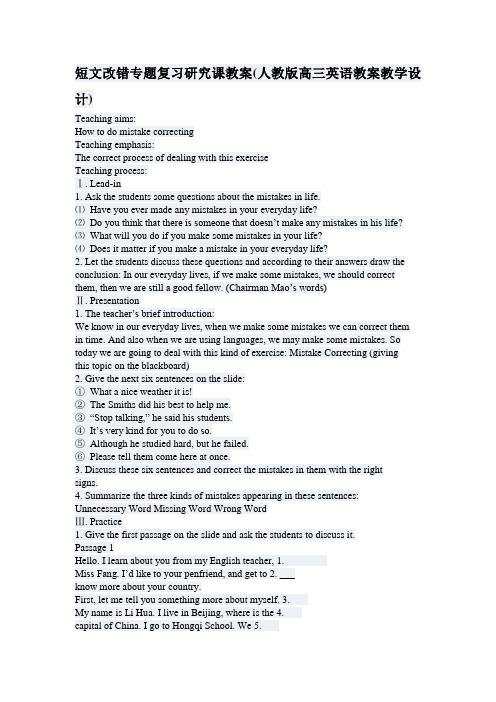
短文改错专题复习研究课教案(人教版高三英语教案教学设计)Teaching aims:How to do mistake correctingTeaching emphasis:The correct process of dealing with this exerciseTeaching process:Ⅰ. Lead-in1. Ask the students some questions about the mistakes in life.⑴Have you ever made any mistakes in your everyday life?⑵Do you think that there is someone that doesn’t make any mistakes in his life?⑶What will you do if you make some mistakes in your life?⑷Does it matter if you make a mistake in your everyday life?2. Let the students discuss these questions and according to their answers draw the conclusion: In our everyday lives, if we make some mistakes, we should correct them, then we are still a good fellow. (Chairman Mao’s words)Ⅱ. Presentation1. The teacher’s brief introduct ion:We know in our everyday lives, when we make some mistakes we can correct them in time. And also when we are using languages, we may make some mistakes. So today we are going to deal with this kind of exercise: Mistake Correcting (giving this topic on the blackboard)2. Give the next six sentences on the slide:①What a nice weather it is!②The Smiths did his best to help me.③“Stop talking,” he said his students.④It’s very kind for you to do so.⑤Although he studied hard, but he failed.⑥Please tell them come here at once.3. Discuss these six sentences and correct the mistakes in them with the right signs.4. Summarize the three kinds of mistakes appearing in these sentences: Unnecessary Word Missing Word Wrong WordⅢ. Practice1. Give the first passage on the slide and ask the students to discuss it.Passage 1Hello. I learn about you from my English teacher, 1. ________Miss Fang. I’d like to your penfriend, and get to 2. ___know more about your country.First, let me tell you something more about myself. 3. ___My name is Li Hua. I live in Beijing, where is the 4. ___capital of China. I go to Hongqi School. We 5. ___study quite a few subject, such as maths, Chinese, 6. ___English and physics. I use to play ping-pong a lot 7. ___in my spare time, but now I am interesting in football. 8. ___Do you play any ball games? What your favourite 9. ___sport? I look forward to hear from you soon 10. ___Yours,Li Hua2. Check the answers one by one and explain the mistakes in it.3. Let the students pay special attention to the signs that should be made.Ⅳ. IntroductionIntroduce the methods and techniques of finishing the exercise of mistake correcting on the slide. Let the students read it and discuss it by themselves.短文改错的解题方法与技巧1.首先要细读全文,弄懂全篇的意思。
2023届高考英语一轮复习短文改错教案

专题七:短文改错精讲执笔人:李雨欣一、考查目标短文改错主要考查考生的语言根本功、在语篇中综合运用英语的精确性及语言观看力量与评价力量。
它集语法学问和语言技能为体,考查内容涉及词汇、语法、句型结构及对行文规律的推断和综合辨析。
二、题型特点2.文章共有十次错误〔一增一删八改〕。
二、解题步骤1.通读文章,找出惹眼根本的错误。
〔通常消失4处〕。
2.把握文章的叙事时态。
3.开头分句阅读,逐句改错。
〔每个句号之前通常为一句话,通常每句话都会消失错误,尤其是简单的从句时〕。
4.假如没有找出全部错误,那么需要复读精读一遍。
三、解题思路方向〔1〕行文规律错误解题大方向2〕词法错误(3)句法错误1)行文规律错误推断此类错误不能只从某个词本身动身,要联系上下文语境,乃至整个语篇去分析。
这就要求考生必需弄懂文章的含义以及内在的行文规律关系。
[例1] Hi, everyone! First, let me tell you more about myself. [解析]依据语境,本句话描述是文章的开头局部,并没有比拟的含义,所以应去掉more。
[例2] I' II never forget the first day on the farm. We arrived here early in the morning.[解析]依据行文规律关系,这两句话描述的是过去发生的事,而且主语we现在不在农场,因此改here为there.2)词法错误1.动词〔谓语动词和非谓语动词〕谓语动词→时态and语态[例1] When | hear the doorbell this morning, | stood up quickly...[解析]从this morning可知,本句话描述过去时,故hear改为heard。
[例2] The bike outside the room is belonged to Tom[解析]短语belong to既无被动也无进行时,所以应去掉is。
高考英语复习专题之短文改错教案
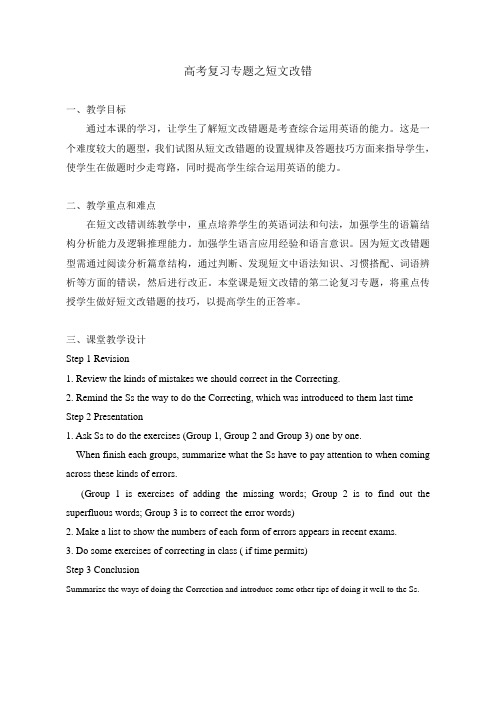
高考复习专题之短文改错一、教学目标通过本课的学习,让学生了解短文改错题是考查综合运用英语的能力。
这是一个难度较大的题型,我们试图从短文改错题的设置规律及答题技巧方面来指导学生,使学生在做题时少走弯路,同时提高学生综合运用英语的能力。
二、教学重点和难点在短文改错训练教学中,重点培养学生的英语词法和句法,加强学生的语篇结构分析能力及逻辑推理能力。
加强学生语言应用经验和语言意识。
因为短文改错题型需通过阅读分析篇章结构,通过判断、发现短文中语法知识、习惯搭配、词语辨析等方面的错误,然后进行改正。
本堂课是短文改错的第二论复习专题,将重点传授学生做好短文改错题的技巧,以提高学生的正答率。
三、课堂教学设计Step 1 Revision1. Review the kinds of mistakes we should correct in the Correcting.2. Remind the Ss the way to do the Correcting, which was introduced to them last time Step 2 Presentation1. Ask Ss to do the exercises (Group 1, Group 2 and Group 3) one by one.When finish each groups, summarize what the Ss have to pay attention to when coming across these kinds of errors.(Group 1 is exercises of adding the missing words; Group 2 is to find out the superfluous words; Group 3 is to correct the error words)2. Make a list to show the numbers of each form of errors appears in recent exams.3. Do some exercises of correcting in class ( if time permits)Step 3 ConclusionSummarize the ways of doing the Correction and introduce some other tips of doing it well to the Ss.Exercise paperGroup 1 Correct the following sentences: Group 2 Correct the following sentences: 1. I met student yesterday. 1. We are going to have a meeting on next2. He is looking a missing book. week.3. He wants have a rest. 2. He is more taller than me.4. He praised by the teacher several times. 3. The boss made workers to work 105. I’m looking forward your letter.hours a day.4. He married with a beautiful girl.Group 3 Correct the following sentences: 5. He is fond of like English.1. It is time of me to take my dog.2. I had knew him before he lived here.3. We were busy taking beautiful picture there.4. He as well as his sister are fond of books.Group 4 Passage Correcting:Passage AA seeing-dog is a very special dog that it helps 1.______blind people walk along the streets, and doing many 2. ______other thing. We call these dogs “seeing-eye dogs” 3. ______One day a seeing-eye dog and the blind man got on 4. ______a bus together. The bus crowded with people and it had 5. ______no empty seats. One man, however, soon got up and left 6. ______his seat. The dog took it’s master to the seat, but there7. ______was very few space. The dog began to push the people8. ______on each side by the nose until they moved down9. ______and finally it was enough room for them two.10. ______- 1 -Passage BLike most of my schoolmates, I have neither brothers nor 1.______ sisters-----in any other words, I am an only child . My parents 2. ______ love me dearly of course and will do all they can make sure 3. ______ that I get a good education. They did not want me to do 4. ______ any work at family .They want me to devote all my time to 5. ______ my studies so that I’ll get good marks in all my subject. We 6. ______ may be one family and live under a same roof, but we do 7. ______ not seem to get much time to talk about together. It looks 8. ______ as if my parents treat me as a visitor and a guest .Do they 9. ______ really understand their own daughter ? What things are in 10. ______ other homes ,I wonder.Passage CI’ve really got to do something to lose weight becauseI’m getting much too fat.I wasn’t worried about it until l go 1. ______ to see the doctor.He told me that I’d probably had a heart 2. ______ attack while l started eating less.When you’re on a diet you 3. ______ have to stop eat too much even though you are always hungry. 4. ______ They may be very hard to do and you certainly need a lot 5. ______ of will-power to succeed.So I will stay on a health farm for a 6. ______ month 1 won’t be able to eat much and so I’ll have to stick7. ______ to my diet.I’ll also do plenty of exercise,which won’t give 8. ______ me any harm too.Both the diet and the exercise will 9. ______ help me to lose weight and feel more better.10. ______- 2 -。
高考英语短文改错专题教案[教学]
![高考英语短文改错专题教案[教学]](https://img.taocdn.com/s3/m/6cce8cb4f9c75fbfc77da26925c52cc58ad6907c.png)
高考英语短文改错专题教案[教学]一、教学目标1. 让学生掌握短文改错的解题技巧和策略。
2. 提高学生识别并改正语法、词汇、标点等错误的能力。
3. 培养学生仔细阅读和审题的习惯。
4. 提升学生在考试中应对短文改错题型的自信心。
二、教学内容1. 短文改错的类型及解题步骤2. 常见语法、词汇、标点等错误案例分析3. 改错技巧与策略讲解4. 专项练习及讲解5. 模拟试题训练及解析三、教学方法1. 采用案例分析法,结合具体错误案例进行讲解和练习。
2. 运用任务驱动法,引导学生主动发现和改正错误。
3. 运用讨论法,组织学生分组讨论,分享解题心得。
4. 运用练习法,通过大量练习巩固所学知识。
四、教学准备1. 准备相关错误案例及练习题。
2. 准备模拟试题及答案解析。
3. 准备教学PPT或黑板,用于展示案例和讲解。
五、教学过程1. 导入:简要介绍短文改错题型及重要性。
2. 讲解:分析常见错误类型,讲解改错技巧与策略。
3. 练习:让学生进行专项练习,教师点评并讲解。
4. 讨论:组织学生分组讨论,分享解题心得。
5. 总结:对本节课内容进行总结,强调重点和难点。
6. 作业:布置相关练习题,让学生课后巩固。
六、教学评估1. 课堂练习:通过课堂练习及时了解学生对知识的掌握情况,针对学生存在的问题进行针对性的讲解和辅导。
2. 课后作业:布置相关练习题,要求学生课后巩固所学知识,培养独立解决问题的能力。
3. 模拟测试:定期进行模拟测试,检验学生对短文改错题型的掌握程度,及时发现并解决学生存在的问题。
4. 学生反馈:鼓励学生提出问题和建议,及时了解学生的学习需求,调整教学方法和策略。
七、教学拓展1. 组织英语角活动:让学生在轻松愉快的氛围中练习英语,提高口语表达能力。
2. 推荐相关英语学习资源:如英语文章、博客、论坛等,扩大学生的英语阅读量,提高英语水平。
3. 开展课外阅读活动:鼓励学生阅读英语原著、报刊、杂志等,提高阅读理解能力。
英语短文改错教案模板(共7篇)
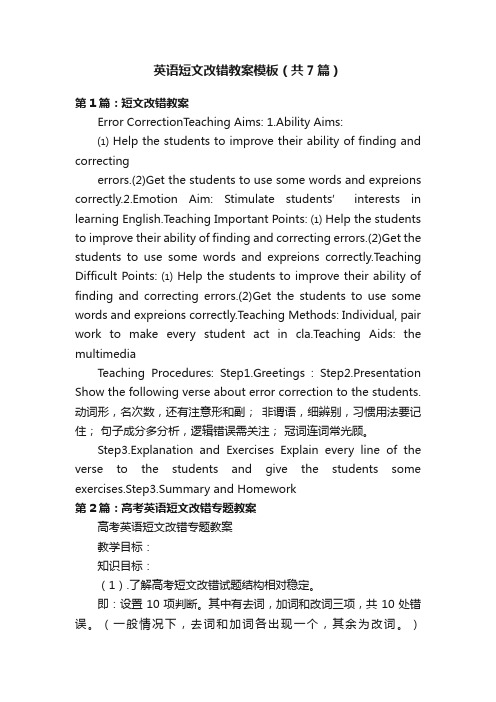
英语短文改错教案模板(共7篇)第1篇:短文改错教案Error CorrectionTeaching Aims: 1.Ability Aims:⑴ Help the students to improve their ability of finding and correctingerrors.(2)Get the students to use some words and expreions correctly.2.Emotion Aim: Stimulate students’ interests in learning English.Teaching Important Points: ⑴ Help the students to improve their ability of finding and correcting errors.(2)Get the students to use some words and expreions correctly.Teaching Difficult Points: ⑴ Help the students to improve their ability of finding and correcting errors.(2)Get the students to use some words and expreions correctly.Teaching Methods: Individual, pair work to make every student act in cla.Teaching Aids: the multimediaTeaching Procedures: Step1.Greetings : Step2.Presentation Show the following verse about error correction to the students.动词形,名次数,还有注意形和副;非谓语,细辨别,习惯用法要记住;句子成分多分析,逻辑错误需关注;冠词连词常光顾。
短文改错专题复习教案
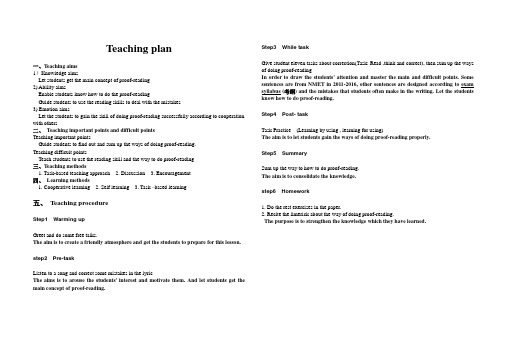
Teaching plan一、Teaching aims1)Knowledge aimsLet students get the main concept of proof-reading2) Ability aimsEnable students know how to do the proof-readingGuide students to use the reading skills to deal with the mistakes3) Emotion aimsLet the students to gain the skill of doing proof-reading successfully according to cooperation with others二、Teaching important points and difficult pointsTeaching important pointsGuide students to find out and sum up the ways of doing proof-reading.Teaching difficult pointsTeach students to use the reading skill and the way to do proof-reading三、Teaching methods1. Task-based teaching approach2. Discussion3. Encouragement四、Learning methods1. Cooperative learning2. Self learning3. Task –based learning五、Teaching procedureStep1 Warming upGreet and do some free talks.The aim is to create a friendly atmosphere and get the students to prepare for this lesson. step2 Pre-taskListen to a song and correct some mistakes in the lyricThe aims is to arouse the students’ interest and motivate them. And let students get the main concept of proof-reading. Step3 While taskGive student eleven tasks about correction(Task: Read ,think and correct), then sum up the ways of doing proof-readingIn order to draw the students’ attention and master the main and difficult points. Some sentences are from NMET in 2011-2016, other sentences are designed according to exam syllabus(考纲) and the mistakes that students often make in the writing. Let the students know how to do proof-reading.Step4 Post- taskTask Practice (Learning by using , learning for using)The aim is to let students gain the ways of doing proof-reading properly.Step5 SummarySum up the way to how to do proof-reading.The aim is to consolidate the knowledge.step6 Homework1. Do the rest exercises in the paper.2. Recite the limerick about the way of doing proof-reading.The purpose is to strengthen the knowledge which they have learned.。
- 1、下载文档前请自行甄别文档内容的完整性,平台不提供额外的编辑、内容补充、找答案等附加服务。
- 2、"仅部分预览"的文档,不可在线预览部分如存在完整性等问题,可反馈申请退款(可完整预览的文档不适用该条件!)。
- 3、如文档侵犯您的权益,请联系客服反馈,我们会尽快为您处理(人工客服工作时间:9:00-18:30)。
短文改错专题复习研究课教案Teaching aims:How to do mistake correctingTeaching emphasis:The correct process of dealing with this exerciseTeaching process:Ⅰ. Lead-in1. Ask the students some questions about the mistakes in life.⑴Have you ever made any mistakes in your everyday life⑵Do you think that there is someone that doesn't make any mistakes in his life⑶What will you do if you make some mistakes in your life⑷Does it matter if you make a mistake in your everyday life2. Let the students discuss these questions and according to their answers draw the conclusion: In our everyday lives, if we make some mistakes, we should correct them, then we are still a good fellow. (Chairman Mao's words)Ⅱ. Presentation1. The teacher's brief introduction:We know in our everyday lives, when we make some mistakes we can correct them in time. And also when we are using languages, we may make some mistakes. So today we are going to deal with this kind of exercise: Mistake Correcting (giving this topic on the blackboard)2. Give the next six sentences on the slide:①What a nice weather it is!②The Smiths did his best to help me.③"Stop talking," he said his students.④It's very kind for you to do so.⑤Although he studied hard, but he failed.⑥Please tell them come here at once.3. Discuss these six sentences and correct the mistakes in them with the right signs.4. Summarize the three kinds of mistakes appearing in these sentences: Unnecessary Word Missing Word Wrong WordⅢ. Practice1. Give the first passage on the slide and ask the students to discuss it.Passage 1Hello. I learn about you from my English teacher, 1. ________Miss Fang. I'd like to your penfriend, and get to 2. ___know more about your country.First, let me tell you something more about myself. 3. ___My name is Li Hua. I live in Beijing, where is the 4. ___capital of China. I go to Hongqi School. We 5. ___study quite a few subject, such as maths, Chinese, 6. ___English and physics. I use to play ping-pong a lot 7. ___in my spare time, but now I am interesting infootball. 8. ___Do you play any ball games What your favourite 9. ___sport I look forward to hear from you soon 10. ___Yours,Li Hua2. Check the answers one by one and explain the mistakes in it.3. Let the students pay special attention to the signs that should be made.Ⅳ. IntroductionIntroduce the methods and techniques of finishing the exercise of mistake correcting on the slide. Let the students read it and discuss it by themselves.短文改错的解题方法与技巧1.首先要细读全文,弄懂全篇的意思.在读的过程可把初步确认的错误标出.2.然后再从以下几个方面仔细推敲.(1)动词→查时态,第三人称单数,非谓语动词,语态,主复句时态是否一致.(2)代词→查前后是否一致.it的用法,以及指示代词,人称代词,不定代词,关系代词的用法是否有误.(3)介词→查搭配及容易误用的介词.(4)形容词副词→查词性有否混淆,形容词与副词的比较级,最高级的用法,修饰比较级的副词等.(5)名词→查单复数,可数不可数,是否加冠词,the,a还是an,主谓一致问题.(6)连词→查上下文之间的逻辑关系.有否误用.3.重读全文,仔细推敲改正后的短文.读起来是否通顺,逻辑思维与短文脉络是否合理,词汇的用法,句子结构是否合理.Ⅴ. Group-work1. Give the second passage on the slide.2. Divide the students into groups of four and ask them to have a competition: Which group can get the correct answers firstPassage 2Last year summer I went to London for a holiday. 1. ___________I spent just a week there. While I am staying there I visited 2. ___________many places of interests and had lots of friendly talks with 3. ___________all kinds people. I found out a very interesting thing there. 4. ___________One of my Chinese friends who has been lived in London 5. ________told me that many English families don't like to buy new 6. ___________television sets. There are many shops where can lend you 7. ________TV sets. The shops are often filled by a great many people. 8. ___________Here they can borrow a set very easy, and it costs them only 9. ___________a little. Then it can be taken home and use for long. 10. ___________3. Let the group that first get the answers give their answers one by one and check it together.Ⅵ. Consolidation1. Give some rules that should be paid attention to when we are doing this exercise on the slide:短文改错应注意的问题一.四不改.即:①标点符号不改.②大小不改.③词序错误不改(不是不改,而是按错词或少词来改).④在纲外生词不改.文中出现带汉语注释的词,在句中不可能用错.二.规范做题方法.①要严格按照示范,即用规定的符号去改错.不要用文字去说明或用箭头去表示.②换词,去词和加词三者不可混淆.2. Give Passage 3 on the slide and ask one or two students to come to the blackboard to finish it quickly.Passage 3Today I visited the Smiths---my first time visit 1. __________to a American family. They live in a small 2. _________town. It was very kind for them to meet me 3. _________at the railway station and drove me to their home. 4. _________The Smiths did his best to make me feel 5._________at home. They offered me coffee and other 6._________drinks. We have a good time talking and laughing 7._________together. They eager to know everything about 8. _________China and asked me lots of question. In fact, 9._________they are planning to visit China in next year. 10._________3. Ask one student to give the general idea of the passage first.4. Check the answers together.Ⅶ. Summary1. Summarize the points that the students should pay attention to when dealing with this exercise.2. HomeworkFinish the mistake correcting exercises in the workbook.。
